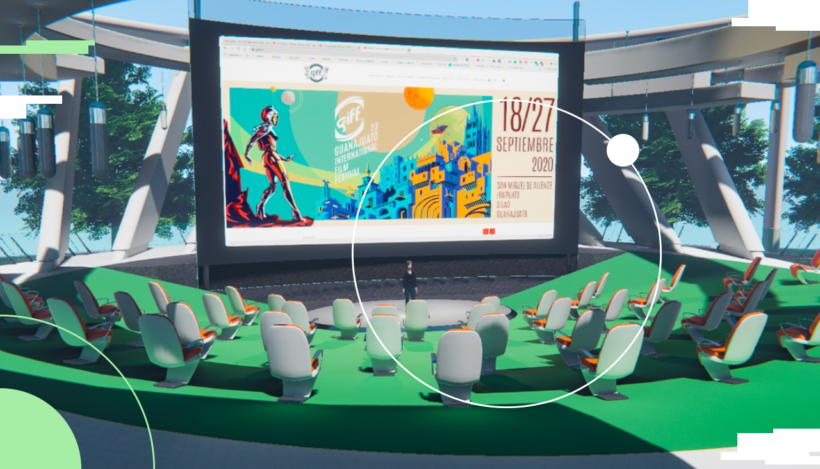
Festival conference room © GIFF
The Festival Internacional de Cine Guanajuato (GIFF), Mexico’s largest film festival that normally draws audiences in excess of 100,000, should have been held in July 2020. But due to the pandemic, its traditional start had to be postponed. Instead of holding it entirely online or cancelling it completely, the festival decided – like many others too – to organise and hold a hybrid festival. For that, the organisers pulled out all the stops, from cinema and open-air screenings to an online programme through to interactive events in cyberspace, and that to an extent never seen before at a film festival.
In a press release, the festival presented its guideline for this reinvention: “Faced with the new global outlook, [the] GIFF stands by its commitment to promote film culture and go beyond borders, which means innovating on the way we communicate and socialize.” Or in other words, the GIFF should also be held in the future as a personal-physical festival, as well as a digital and virtual event.
Personal-Physical
Already at the time when the GIFF (Guanajuato International Film Festival) was still a short film festival named “Expresión en Corto International Film Festival”, it was being held in unusual and exotic locations. In addition to galleries, exhibition halls and cinemas of course, the earlier screening locations also included underground tunnels or the famous Museo de las Momias in Guanajuato. Appropriate thematic programmes were shown at the various locations, such as horror films in the Museum of the Mummies.
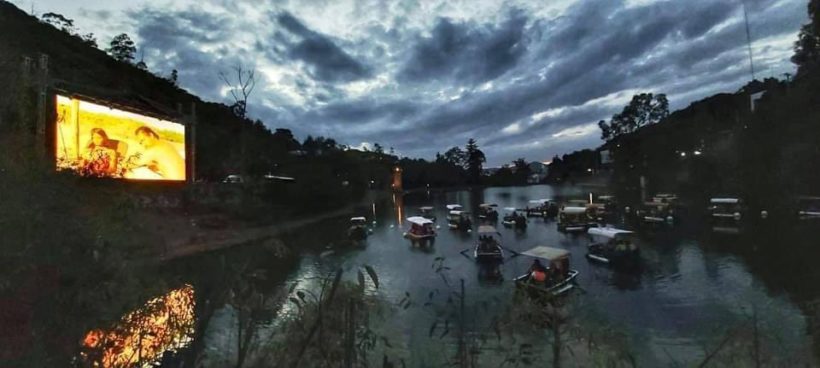
Aquacinema at the El Ollo dam in Guanajuato © GIFF
This year, the festival was able to benefit from the experience it had gained in its prior open-air events. In addition to an “Autocinema” on a parking lot, and a “Picnic-cinema” outdoors in nature, the festival even relocated part of its programme onto water. In “Aquacinema” – a premiere in Latin America – the audiences in small boats on the lake before La Olla dam were able to view children’s films during the daytime on a big screen set up at the lakeside, and competition films on it in the evenings. Buoys were placed in the water to maintain the social distance between the boats. Food and drinks were provided at the embarking point, or as a picnic basket to take on the boat trip. A total of 30 boats, each intended for a maximum of four persons, were available and set sail several times each day.
Digital
On its GIFF-TV screening platform, each day from 18 to 26 September the festival presented differing programmes, consisting of selections from the Mexican Short Film, Experimental Short Film, Mexican Documentary, International Documentary and Mexican Feature und International Feature competition sections. 137 of the 170 festival titles were available for viewing online. Over the complete festival period, the films were streamed with successive screening times and could only be viewed in Mexico (geo-blocking). The access was limited to a maximum of 1,000 “tickets”, valid for a limited period of 24 hours. You had to register to view the screenings but, for that, access was cost-free.
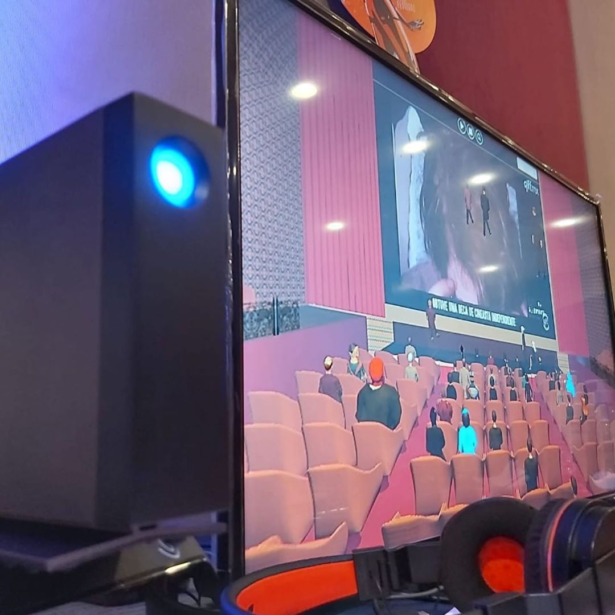
Festival office – on the working screen: digital projection in front of audience avatars in virtual 3D space © GIFF Instagram
Each film had its own dedicated internet page with synopses and background information. In addition, discussions and chats between film critics and filmmakers were released on a festival Vimeo channel. In these video chats, extract from the related films could be seen, meaning that they had been produced in advance and were not held as live events.
Virtual
For the first time ever at a film festival, “virtual rooms” were created. Here, using an avatar, everyone could join industry get-togethers, conferences, the Critics’ Room and concerts in real time.
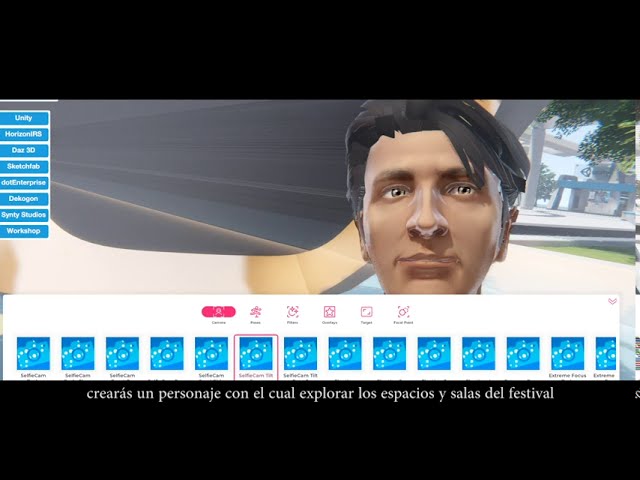
“Create a character with which you can explore the rooms and halls of the festival.” © GIFF
Festival Director Sarah Hoch had this to say about it in a pre-announcement: “The GIFF is one of the most technologically advanced festivals in the world. We were one of the first festivals with screenings in virtual reality, conferences on designing creative content and with the production of VR films. And for this reason, we have now entered this “world”. The people will be able to create their avatar and access it via the “Virbela” platform[1], which looks like a congress centre. Two days will be spent [there] in real time. We will all be connected in real time with our avatars at the production days and in the conferences. You’ll be able to ramble around the campus, and we even have two lecture halls and meeting rooms. Anyone who has a computer can come here and look forward to meeting a player, a journalist, a film fanatic, through to everyone who likes films.”
In addition to the events for the industry with specialists and professionals from the film sector, including pitching meetings with international producers and film funders, film reviews and critiques represented one focal section of the festival. This area included El Salón de la Crítica Presenta, El Taller de la Crítica and the Q&A Creadores Frente a la Crítica. Already prior to the festival, seven monthly rounds of El Salón de la Crítica were held from January to July 2020, consisting of a virtual space to which every up-and-coming critic could submit reviews on a film, in order for them to be discussed by a professional critic.
The Critics’ Lounge organised and ran three conferences for film critics and journalists. Moreover, talks were held on the films in the festival’s competition section, in which 37 directors, one producer, one actress, a musician and 29 film critics and journalists participated.
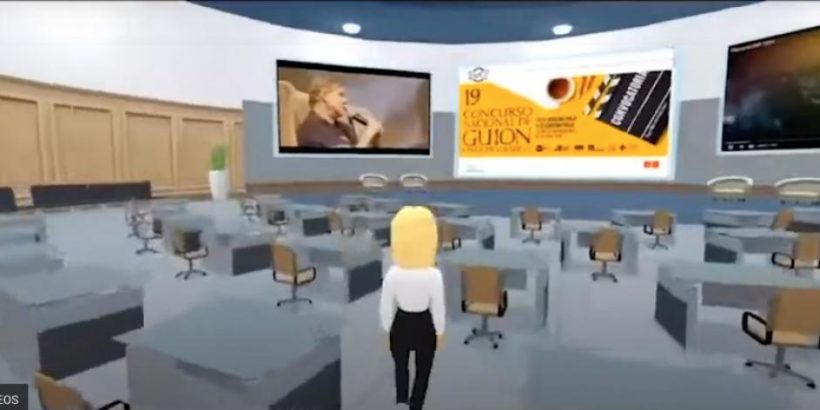
Campus virtual © GIFF
In addition, El Taller de la Crítica (the Critics’ Workshop) was held – a training room created with the aim of professionalising up-and-coming film reviewers and headed by an experienced film critic. Likewise, Q&As provided opportunities to ask questions of directors.
Furthermore, expanded media reporting occurred via live events such as masterclasses, discussion rounds and conferences, which were broadcast on the festival’s GIFF-TV platform and aired live on both the festival’s website as well as on Facebook.
The GIFF was presented virtually on the multi-user playground platform Sinespace[2]. This was accessible using the Breakroom app, with support from Virtualware and decorated with digital art from Demiurgo.
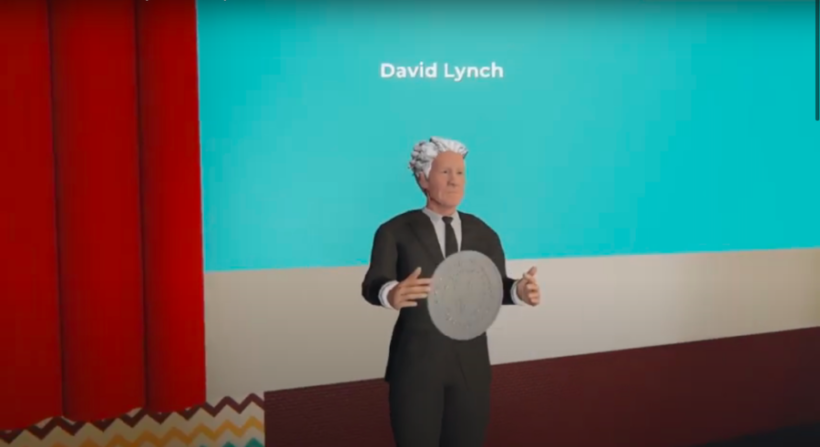
Avatar David Lynch receives a medal as a lifetime achievement award © GIFF
One unique highlight of the “virtual activities” was the participation of David Lynch – to whom a tribute programme was dedicated – in the presenting of the Career Achievement Award. David Lynch insisted on “personally” accepting the Medal of the Archive of Universidad Nacional Autónoma de Méxiko, which is linked to the award. His self-similar avatar was created by him and his team for the occasion, with only the design of its hair causing a few issues.
Conclusion
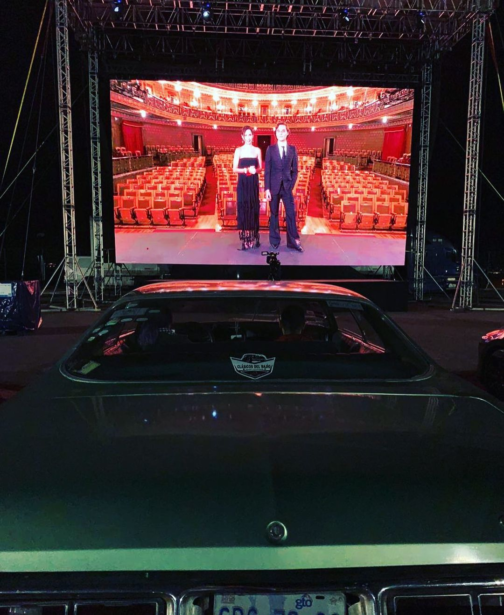
Broadcasting the award ceremony in an empty cinema on the autocinema screen © GIFF Instagram
With its threefold strategy – of having new open-air event locations, an online programme with films and Q&As, as well as virtual 3D environments – the GIFF succeeded in retaining as much as possible from the lively real-person encounters and communal experience that are part of what defines a festival – and that despite having closed in-door event spaces.
“The pandemic has encouraged creative thinking and has forced us to not only think outside the box but to work outside of it too,” Festival Director Sarah Hoch added. “While for years many within our own industry have been reluctant to embrace new technologies, today it’s given us an opportunity to not only weather this storm but to also remain relevant, by opening up new possibilities for us and for future events that may follow in our footsteps.”
Links:
URL of the festival: GIFF
URL: VirBELA
URL: Sine Space
[1] VirBELA is a Californian start-up company headquartered in La Jolla that develops virtual worlds with a team of designers, 3D artists, game developers and psychologists for distance learning and educational purposes especially. The company is also known for its Pinnacle Virtual Film Studio (together with Appreciated Media). VirBELA was acquired in 2018 by the real estate brokerage eXp World Holdings.
[2] The London-based company Sine Wave Entertainment, which also supports virtual reality, developed Sinespace on the basis of a prior immersive MUD model. When the global spread of the Corona virus occurred, the company changed its focus. The result of this is the Breakroom app, which is designed for working together over distances. In addition to video conferences, Breakroom offers instant messaging, meeting rooms and digital collaboration tools, as well as social rooms.
1 Trackback